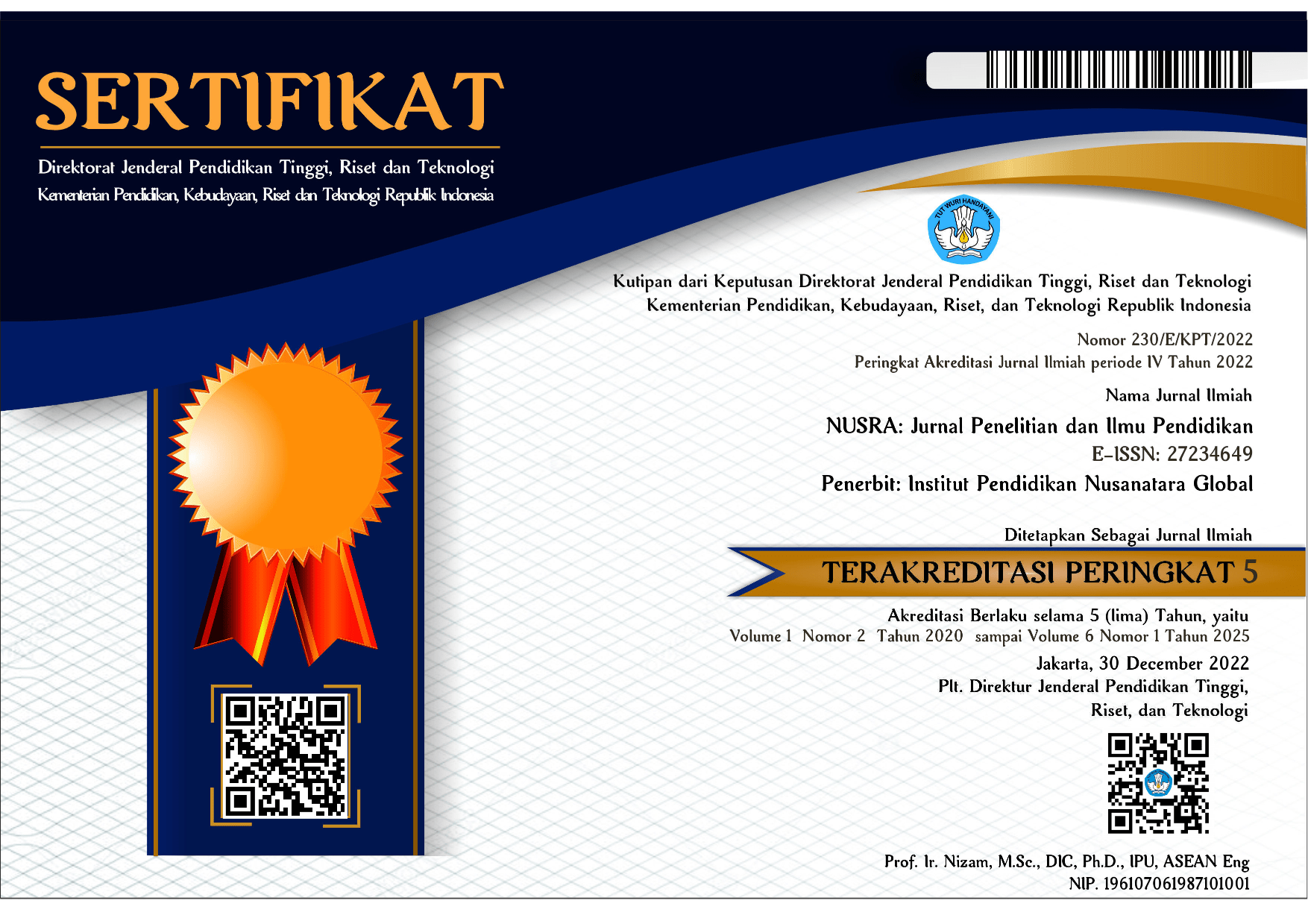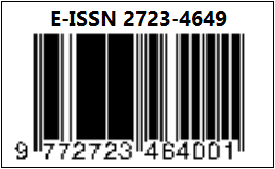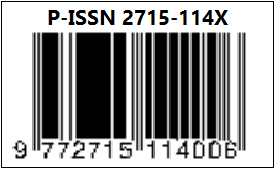Epistemologi Pendidikan: Elaborasi Pengetahuan untuk Mencapai Keautentisitasan Kecerdasan Manusia
DOI:
https://doi.org/10.55681/nusra.v5i2.2480Keywords:
Epistemology, Knowledge, TruthAbstract
The fundamental question in educational philosophy that is in line with the goals of education is the question of why humans must be educated and what goals must be achieved in the educational process. In a different sense, educational epistemology concerns the issue of how we arrive at knowledge about educational problems. The main issues and ideas of epistemology are; a) what is knowledge? b) what is the best and safest way to gain knowledge? c) what is the value of knowledge? One of the goals of epistemology is to determine the criteria for knowledge so that we can know what can or cannot be known, in other words the study of epistemology basically includes the study of meta-epistemology (what we can know about knowledge itself). The nature of knowledge centers on the question "how" we know what we know, what makes us believe that something is "true". Epistemology is not just about acquiring knowledge but also about understanding the process of acquiring knowledge. Thus the real question is "with what should education begin?" and "with what knowledge should knowledge about education begin?".
Downloads
References
Anderson, J. R. (1995). Cognitive Psychology and its Implications (4th ed). New York: W.H. Freeman and Company.
Anderson, Elizabeth. (2007). Fair Opportunity in Education: A Democratic Equality Perspective. Ethics, 117(4): 595–622. doi:10.1086/518806.
Esti, Sri. (2006). Psikologi Pendidikan. Jakarta: Grasindo.
Gettier, E. (1963). Is Justified True Belief Knowledge? Analysis 23. 121-132.
Goleman, Daniel. (2003). Emotional Intelligence. Jakarta: PT Gramdia Pustaka.
Goldman, A. (1979). What is Justified Belief? In G. S. Pappas (ed.), Justification and Knowledge. Dordrecht: Reidel.
Gopnik, A. (1988). Conceptual and semantic development as theory change. Mind and Language, 3, 197-217.
Goldman, A. (1991). Stephen P. Stitch: The Fragmentation of Reason. Philosophy and Phenomenological Research 51(1): 189-193.
Gopnik, A. (1996). The scientist as child. Philosophy of Science, 63, 485-514.
Gopnik, A., & Meltzoff, A. (1997). Words, Thoughts, and Theories. Cambridge: M I T Press.
Goldman, A. (1999). Knowledge in a Social World. Oxford: Oxford University Press.
Heider, F. and Simmel, M. (1944). An experimental study of apparent behavior. American Journal of Psychology 57: 243–259.
Heider, F. (1958). The Psychology of Interpersonal Relations, New York: Wiley.
Hempel, C. (1965). Aspects of Scientific Explanation and Other Essays in the Philosophy of Science. New York: Free Press.
Kant, Immanuel. (1781). Critique of Pure Reason, trans. N.K. Smith. London: Macmillan.
Kvanvig, J. (2003). The Value of Knowledge and the Pursuit of Understanding. NY: Cambridge University Press.
Kvanvig, J. (2009). The Value of Understanding In D. Pritchard, A. Haddock and A. Millar (eds.), Epistemic Value. Oxford: Oxford University Press.
Kvanvig, J. (2013). Curiosity and a Response-Dependent Account of the Value of Understanding. In T. Henning and D. Schweikard (eds.), Knowledge, Virtue and Action. Boston: Routledge.
Lehre, K. & Paxsn, T. (1969). Undefeated Justified True Belief. Journal Of Philosophy 66.
MacFarlane, J. (2005). Making Sense of Relative Truth. Proceedings of The Aristotelian Society.
Malle, B. F. and Ickes, W. (2000). Fritz Heider: Philosopher and psychologist. In G. A. Kimble and M. Wertheimer (eds.), Portraits of Pioneers in Psychology. Washington (DC), American Psychological Association, vol. IV, pp. 195–214.
Massimi, M. (2018). Four Kind of Perspectitival Truth. Philosophy and Phenomenological Research Vol XCVI No.2
Mayer, Robert R. (1984). Rancangan Penelitian Kebijakan Sosial; Seri Pustaka Teknologi Pendidikan. Penerjemah Sutan Zanti Arbi & Wayan Ardhana. Rajawali: Jakarta
Pritchard, D. (2005). Epistemic Luck. Oxford: Oxford University Press.
Pritchard, D. (2007). Recent Work on Epistemic Value. American Philosophical Quarterly 44 (2007): 85-110.
Pritchard, D. (2008). Knowing the Answer, Understanding and Epistemic Value. Grazer Philosophische Studien 77: 325-39.
Pressley, M., Levin, J. R., & Delaney, H. D. (1982). The Mnemonic Keyword Method. Review of Educational Research.
Reigeluth, Charles M. (1982). The Elaboration Theory’s Procedure for Designing Instruction: A Conceptual Approach. Spring: Journal of Instructional Development.
Sosa, Ernest. (2007). A Virtue Epistemology: Apt Belief and Reflective Knowledge, Volume I. Oxford: Clarendon Press.
Sosa, Ernest. (2009). Reflective Knowledge: Apt Belief and Reflective Knowledge, Volume II. Oxford: Clarendon Press.
Sugiyono. (2005). Metode Penelitian Bisnis. Bandung: Alfabeta.
Sugiyono. (2011). Metode Penelitian Kualitatif dan R&D. Bandung: Alfabeta.
Unger, P. (1968). An Analysis of Factual Knowledge. Journal of Philosophy 65.
William, J. (1956). The Will to Believe and Other Essays in Popular Philosophy and Human Immortality. New York: Dover.
Zagzebski, L. (2001). Recovering Understanding In M. Steup (ed.), Knowledge, Truth and Obligation. Oxford: Oxford University Press.
Zagzebski, L. (2009). On Epistemology. CA: Wadsworth.
Downloads
Published
How to Cite
Issue
Section
License
Copyright (c) 2024 Bayu Jati Jatmika, Kiki Amalia

This work is licensed under a Creative Commons Attribution-ShareAlike 4.0 International License.














